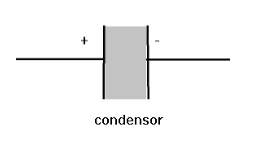
A condenser stores:
(A) Potential
(B) Charge
(C) Current
(D) Energy in a magnetic field
Answer
571.5k+ views
Hint : First we will start with understanding the meaning of condenser. A condenser is another name for a capacitor. A capacitor is a device that stores electrical energy in the form of an electric field. It consists of two terminals and it is a passive component.
Complete step by step answer
Now as we know the capacitor stores the electrical energy in the form of an electric field and the electric field is nothing but the amount of charge which passes through a conductor of a unit area in unit time. Hence capacitor stores charges in it.

As we know that charge stores in the capacitor are proportional to the capacitance of the capacitor at a particularly given voltage. Hence
$ \Rightarrow C = \dfrac{Q}{V} $
As $ V $ is voltage and $ C $ is the capacitance of the capacitor and $ Q $ is described as a charge.
Hence option (B) is the correct answer.
Additional Information
A condenser or capacitor is a very useful device as it stores the electrical charges which can be released back when requires. A capacitor that is connected to a circuit can be used in various tasks such as filtering, smoothing, and also as a bypass. In our day-to-day life, it is used in a variety of things such as to perform power conditioning, remote sensing, signal coupling, and decoupling, etc. Capacitors are less sensitive to temperature hence can be used to handle the loss of power very effectively.
Note
we should not get confused about the capacitance with a capacitor. A capacitor is an electrical device that stores electrical energy in the form of an electric field while capacitance is a property of capacitor which shows the ratio of the amount of electric charge to a difference in the electrical potential across the capacitor.
Complete step by step answer
Now as we know the capacitor stores the electrical energy in the form of an electric field and the electric field is nothing but the amount of charge which passes through a conductor of a unit area in unit time. Hence capacitor stores charges in it.

As we know that charge stores in the capacitor are proportional to the capacitance of the capacitor at a particularly given voltage. Hence
$ \Rightarrow C = \dfrac{Q}{V} $
As $ V $ is voltage and $ C $ is the capacitance of the capacitor and $ Q $ is described as a charge.
Hence option (B) is the correct answer.
Additional Information
A condenser or capacitor is a very useful device as it stores the electrical charges which can be released back when requires. A capacitor that is connected to a circuit can be used in various tasks such as filtering, smoothing, and also as a bypass. In our day-to-day life, it is used in a variety of things such as to perform power conditioning, remote sensing, signal coupling, and decoupling, etc. Capacitors are less sensitive to temperature hence can be used to handle the loss of power very effectively.
Note
we should not get confused about the capacitance with a capacitor. A capacitor is an electrical device that stores electrical energy in the form of an electric field while capacitance is a property of capacitor which shows the ratio of the amount of electric charge to a difference in the electrical potential across the capacitor.
Recently Updated Pages
Master Class 12 Economics: Engaging Questions & Answers for Success

Master Class 12 Physics: Engaging Questions & Answers for Success

Master Class 12 English: Engaging Questions & Answers for Success

Master Class 12 Social Science: Engaging Questions & Answers for Success

Master Class 12 Maths: Engaging Questions & Answers for Success

Master Class 12 Business Studies: Engaging Questions & Answers for Success

Trending doubts
Which are the Top 10 Largest Countries of the World?

What are the major means of transport Explain each class 12 social science CBSE

Draw a labelled sketch of the human eye class 12 physics CBSE

Differentiate between insitu conservation and exsitu class 12 biology CBSE

Draw a neat and well labeled diagram of TS of ovary class 12 biology CBSE

Give 10 examples of unisexual and bisexual flowers




